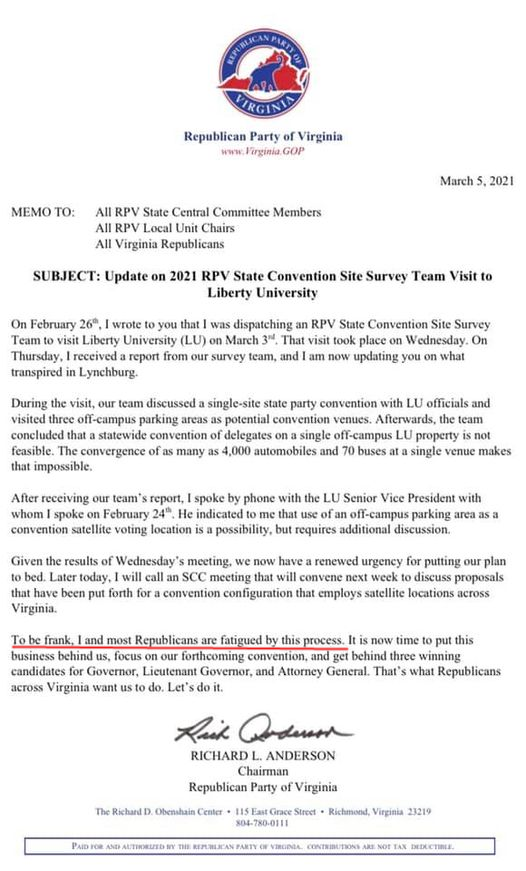
adopting a nominating process for Republican statewide candidates in 2021 became so complicated that it exhausted the party's leadership
Source: Republican Party of Virginia

adopting a nominating process for Republican statewide candidates in 2021 became so complicated that it exhausted the party's leadership
Source: Republican Party of Virginia
The COVID-19 pandemic triggered changes in the nomination process for the two main political parties in Virginia. The Democrats experienced far less trauma in adapting to the circumstances than the Republicans, because the Democrats chose to rely upon a state-run primary rather than a party-led convention.
The governor's health restrictions required social distancing and limited public gatherings in early 2021. That impacted the ability of candidates with less funding and name recognition to gather the required 10,000 signatures, including a minimum of 400 signatures from qualified voters in each of the 11 Congressional districts.
Two Democratic candidates filed suit in state court to force a reduction in the number of signatures required to get on the ballot. All the Democratic candidates then negotiated a settlement, reducing the requirement to 2,000 qualified voters, with just 50 required from each district.1
In contrast, the Republicans struggled for months to adapt plans for a large statewide convention to the restrictions on gatherings.
At the end of 2020, the Republican State Central Committee chose to use a convention rather than a state-run primary or party-run firehouse primaries to nominate candidates for statewide races in 2021. At the same time, the Republicans chose to use firehouse primaries to nominate candidates for House of Delegates seats. Local party units scheduled the primaries in April/May on days that suited them; there was no single date for all Republican firehouse primaries in 2021.
Choosing to nominate candidates for Governor, Lieutenant Governor, and Attorney General by convention tilted the playing field in the favor of some candidates and against others. One commentator noted that the Republicans would be paying taxes so the Virginia Department of Elections and local Electoral Boards could manage the June 8 state-run primary, but Republicans had adopted:2
For the 2021 races, the focus was on the race for Governor. A convention was anticipated to limit the potential of State Sen. Amanda Chase winning the Republican nomination with just a plurality of votes.
She planned to campaign on a very socially conservative, pro-Trump, pro-gun rights agenda. However, Virginia voters had given Trump only 44% of the vote in the November 2020 election. Several other candidates anticipated that Virginians would be ready to support Republican candidates after one year of President Biden, but not to endorse an incendiary "Trump in heels" candidate.
Political strategists calculated that in the 2021 general election, a hard-right Republican candidate would be defeated by a more-moderate Democratic candidate - as had occurred in the 2018 US Senate race, when pro-Trump Republican candidate Corey Stewart was defeated by more-moderate Democrat Mark Warner.
If a primary was used in 2021 for the Republican process for selecting a candidate for Governor, State Sen. Chase might win the nomination in May with a plurality of votes from an pro-Trump base. Her supporters were intensely committed, but projected to be a minority of the Republican Party.
The potential for State Sen. Chase to attract swing voters in November and get more than 44% of the vote was questionable. At a Republican convention, a plurality of votes would not be sufficient; the nominee would be selected only after capturing over 50% of votes from the delegates. If no candidate on the initial ballot got a majority of the votes, then delegates would vote again - and again and again, if necessary, until delegates dropped support for their initial preference, endorsed a second choice, and someone earned over 50% of the vote of all the delegates in attendance.
At conventions, the nominating procedures do not eliminate candidates who receive the least votes. Candidates with just minimal support typically remain in the race and negotiate deals before endorsing someone else. Convention delegates retain their option to vote for any candidate, but typically switch to support whomever their preferred candidate has endorsed - after the negotiations have been completed.
Only committed Republicans attend a Republican convention. In 2020, party leaders chose to use a convention eve though they recognized that State Sen. Amanda Chase would attract enthusiastic Trump voters to a convention. However, party leaders also calculated that more delegates from the Republican "base" would participate. At a convention where one candidate had to get 50% of the vote, delegates were expected to coalesce ultimately around one moderate candidate. That person might have less-enthusiastic support at the convention, but would attract more votes in the November election. By seeking to nominate a more-moderate candidate for governor via the convention process in 2021, the Republican leadership increased the potential to win the three statewide elections and perhaps win more House of Delegates seats.
Had the party leaders chosen to nominate statewide candidates in 2021 through a state-run primary, independents and even Democrats could have participated. Those voters were even less likely to support the pro-Trump State Senator, but the choice in a primary was not going to be between one pro-Trump candidate vs. one moderate. Even in a party-run primary, where only recognized Republicans would be allowed to vote, the risk was high that the multiple moderate candidates would split the vote and the one pro-Trump candidate would win by plurality.
After the decision to use a convention rather than a primary, State Senator Chase announced she would run as an Independent rather than seek the Republican nomination. Based on her policy positions and campaign style, every vote she would attract as an Independent was expected to reduce the number of votes for the official Republican candidate.
The prospect of winning a statewide election as an Independent was low; no one had done so in Virginia since sitting Sen. Harry F. Byrd Jr. in 1970. She reversed course a few days later and declared she would seek the Republican nomination through the convention process.
Chase's desire for a primary was a reversal of traditional Republican nominating strategy. Candidates with a strong ideological focus normally sought a convention, which attracted committed Republicans who had endured many local meetings before being chosen as a delegate. Swing voters, without a strong philosophical commitment, were less likely to attend all the meetings necessary to get elected as a convention delegate. However, as noted by savvy political observer Larry Sabato:3
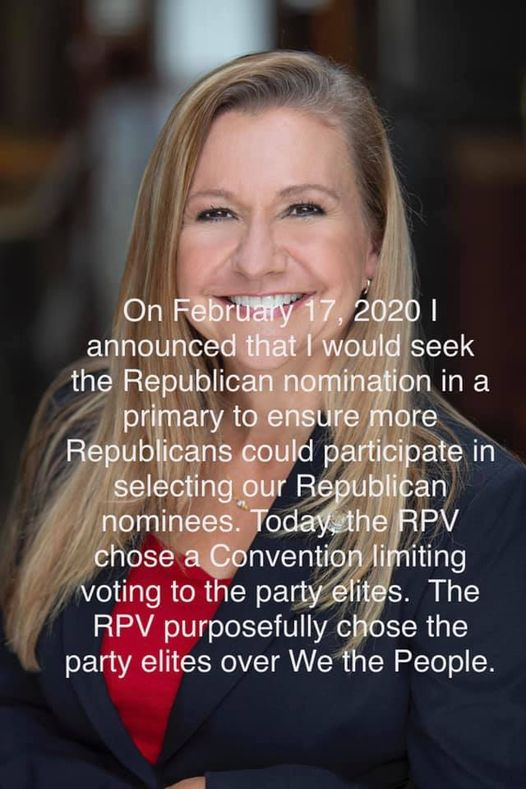
after the Republican State Central Committee chose to use a convention rather than primary for 2021 nominations, State Sen. Amanda Chase announced she would run for governor as an Independent
Source: State Senator Amanda Chase, Facebook post (December 6, 2020)
As other potential candidates considered entering the race and as COVID-19 restrictions on large meetings continued to be revised, the State Central Committee of the Republican Party wavered on the process for nominating its 2021 candidates. The decision to hold a convention was re-examined for weeks, as different leaders calculated how changing the nomination process might change the results. State Sen. Amanda Chase claimed she could recruit enough delegates to win nomination at a convention, while other Republican leaders concluded that her support among idealogues would not expand enough for her to win the general election.
The State Central Committee acknowledged that the initial decision to hold a convention might not be realistic in 2021; COVID-19 pandemic restrictions might block the delegates gathering together at one location. One option would be to convert the convention into an "unassembled" meeting, with voters dropping off ballots at different locations on the same day. Since multiple ballots would not be feasible in drop-in voting, a ranked-choice voting process could be adopted to ensure the eventual winner had over 50% support. That approach would reduce the potential for State Senator Amanda Chase to win with a plurality from hard-right Trump supporters, while other candidates split the majority of the votes.
Changes to the convention process, which are defined in bylaws known as the "party plan," required approval by 75% of the State Central Committee. One conservative radio host expressed frustration over the confusion, saying:4
In January, 2021, a vote to change the Party Plan and allow an unassembled convention with ranked choice voting failed to gain 75% support at the State Central Committee. Rather than continue the meeting and consider switching to a party-run or state-run primary, the convention supporters abruptly adjourned the meeting. A majority of the Republican State Central Committee later reaffirmed plans to hold a standard in-person convention, since there was not a 75% supermajority willing to support any alternative.
If the planned convention was blocked by COVD-19 limits on public gatherings, the party chair noted that Republicans would have only one politically-unacceptable mechanism for choosing 2021 candidates for Governor, Lieutenant Governor, and Attorney General races.5
Nomination by a District Committee is not uncommon, in cases where a nominee drops out of a race after standard nomination but before an election. In 2017, for example, the Republican nominee for the Second District of the House of Delegates quit the race in August. He had been unopposed for the nomination two months earlier, when he had claimed to have earned degrees from George Washington University. His credibility was ruined when that claim was revealed to be false.
The Second District Republican Committee quickly chose the replacement candidate, and in time to get the correct name listed on the November ballot. The delay required to hold a convention or primary, rather than allow the District Committee to choose a replacement, would have left too little time for the nominee to campaign even if their name had made it on the ballot.
At the state level, nominating a candidate by the Republican State Central Committee was rare. That committee last chose a candidate in 1978. The party had nominated Richard D. Obenshain in a race for a US Senate seat, but he died in a plane crash during the campaign. The State Central Committee then chose John Warner III, and he won the election.6
A nomination process that excluded all voters and delegates, with the selection made by just the Republican State Central Committee, was the worst-case scenario for State Senator Amanda Chase. She knew that the majority of that committee was seeking a more-moderate candidate with a higher probability of winning the general election in November. Chase filed a lawsuit in Richmond Circuit Court seeking an injunction to block the planned convention, though the filing did not propose an alternative.
Then the lingering dissention within the 76-member Republican State Central Committee erupted when 31 members who supported a primary unsuccessfully tried to force an unscheduled meeting of the committee. The majority of the committee had opposed a June 8 state-run or party-run primary in which the winner could be selected by a plurality of votes, and supported a convention that required a majority.
A traditional Virginia Republican convention involved 10,000 or more people in one location, voting as many times as needed until a candidate had a majority. The 1994 convention, for example, had 14,000 delegates assembled in the Richmond coliseum.
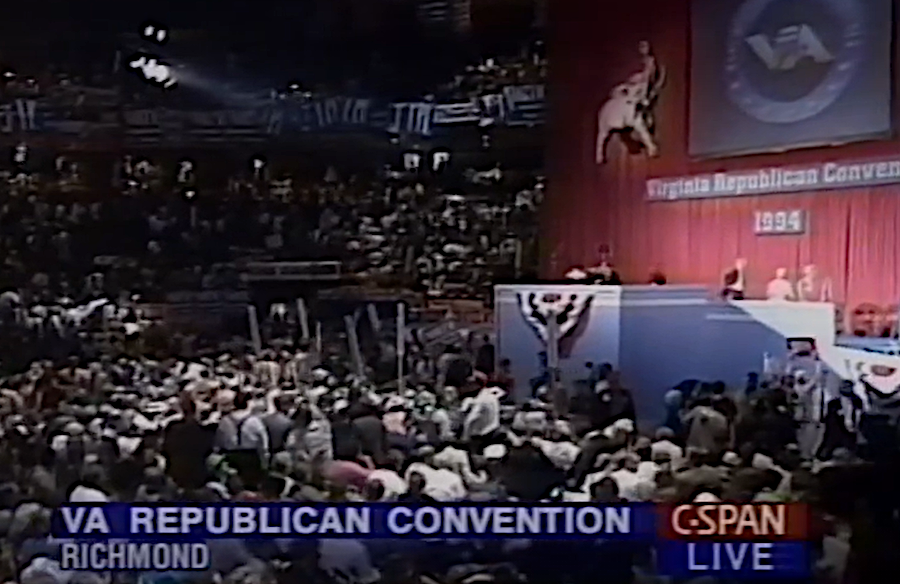
14,000 Republican delegates nominated candidates at a convention in the Richmond Coliseum in 1994
Source: CNN
Everyone recognized that COVID-19 restrictions might limit the size of an in-person meeting in 2021. However, the pro-Chase minority which supported a primary (which she could win with just a plurality of votes) successfully blocked the majority from making a change and holding an unassembled convention on May 1. The minority had enough votes to block the majority from achieving the 75% supermajority required for changing the State Party Plan.
Then the minority, fearing the convention would be cancelled and the State Central Committee would end up choosing the Republican candidates for statewide offices, proposed holding a firehouse primary ("canvass"). All Republicans, not just convention delegates chosen by the party establishment serving on local committees, would get an opportunity to vote. Drive-through voting locations would be established in all 11 Congressional districts.
Since the Virginia Department of Elections would not be funding the firehouse primary, the party could implement its own rules. The minority proposal was designed to attract the support of the faction opposed to the nomination of State Senator Amanda Chase by allowing ranked-choice voting. A 50% majority would be required for nomination, but that could be determined while people voted just once with ranked-choice ballots.
The majority balked. A Republican leader noted that his party was split evenly between two camps. The one poll that was released before the Republican State Central Committee chose the nomination process, less than nine months before the election, had given State Senator Amanda Chase about 25% of the vote if a primary was held. The fragmented support for the top three more-moderate candidates, when added together, totaled just 25%.
No matter which camp won the dispute over the nomination process, the other camp threatened to run an independent candidate. Such a candidate would split the Republican vote in the 2021 general election and would ensure a Democratic victory in November. As described by former Representative Tom Davis:7
The State Central Committee met again and renewed its commitment to hold an in-person convention, in one location, in a 37-31 vote. To deal with public health limits on gatherings due to COVID-19, the delegates were to be dispersed across 25,000 parking spaces at Liberty University. Ranked choice voting would be use to select a winner with over 50% of the final votes.
The decision, including the switch in convention date from May 1 to May 8, caught Liberty University by surprise. It quickly announced that the university was willing to rent multiple parking lots to any political party, at market rates that it charged car dealers, circuses, and other renters in the past.
After a site visit to the campus and discussion with university officials, the State Central Committee reversed course. It determined that Liberty University could not accommodate 4,000 automobiles and 70 buses at a single venue and meet potential COVID-19 restrictions, especially if variants of the virus cause a new wave of infections.
When the drive-in convention proposal fell apart, the State Central Committee was forced to call yet another meeting to re-consider its options. By that time, the deadline for requesting a state-run primary had passed; all remaining options required party volunteers to handle the process. The chair of the Republican Party of Virginia declared:8
In March, 2021, the Republican State Central Committee finally, finally, finally corralled the necessary votes to adopt a plan. It announced the 2021 statewide nomination process would be conducted by a "disassembled" convention, spread across the 11 Congressional Districts, rather than the planned statewide gathering at one location.
The State Central Committee decided that there would be 37 designated locations open between 9:00am-4:00pm on May 8, 2021 for delegates to cast their vote. It also left open the option of adding additional locations if more than 1,200 delegates were certified in the counties of Chesterfield, Fairfax, Henrico, or Loudoun, or in the cities of Chesapeake or Virginia Beach. In the end, two more locations were added.
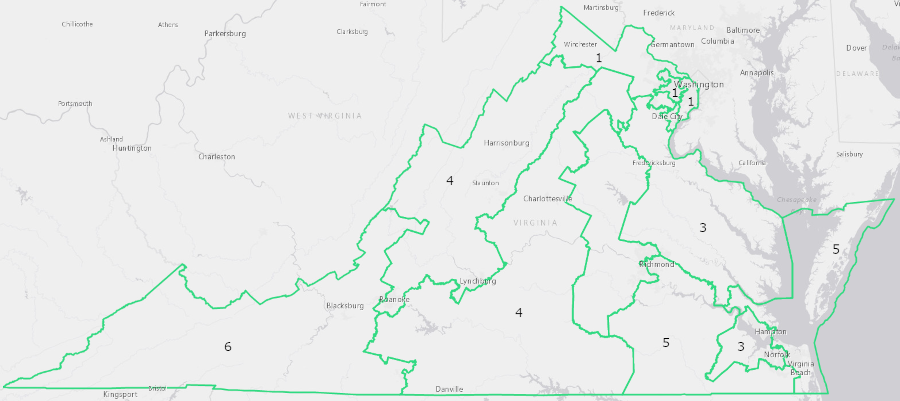
Republican delegates in the 2021 unassembled convention could vote in one of six locations in the Ninth District, but had fewer choices in other districts
Map Source: Virginia Redistricting Commission
Republicans could vote on May 8 only if they had been elected previously as a delegate to the disassembled convention by their local city and county unit. That required potential delegates to supply their Voter Number, available from the Virginia Department of Elections.
That state agency did the Republicans no favors when it shut down the website with Voter Numbers on the last day for potential delegates to file, blocking some people from obtaining their number and completing the delegate application form. The Virginia Department of Elections said the outage had been scheduled long ago for maintenance required in advance of early voting for the state-run Democratic primary. Republican officials complained of "one-party rule" by Democrats insensitive to Republican deadlines, at a time when Republican officials in other states were being accused of revising procedures to facilitate voter suppression.9
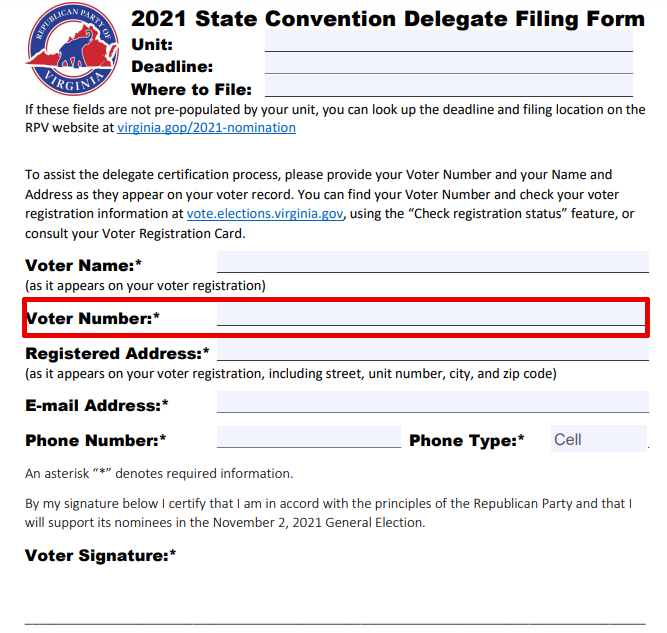
potential Republican delegates had to provide their Voter Number when filing paperwork with the party
Source: Republican Party of Virginia, Delegate Pre-file Form for Unit Chairmen
Each local unit of the Republican Party (typically organized by city and county) was granted flexibility in choosing delegates, except people serving in the military were automatically qualified as a delegate and did not need to be elected.
City and county units could elect as many delegates as they chose. When local leaders provided a list of official delegates to the chair of the Republican Party of Virginia 14 days before the date of the unassembled convention, almost 53,000 people had signed up. That number far surpassed the 8,000 who attended the Republican convention in 2013, but was far short of the 366,000 votes cast in 2017 when the Republicans used a primary to nominate their candidates for statewide office.
However, the number of total votes assigned to each unit was based not on the number of delegates chosen or even on the population of the unit, but instead on previous support for Republican candidates:10
For the 2021 convention, Franklin County with a population of 56,000 people was entitled to 132 votes at the convention based on its strong support for President Trump on 2020. The City of Richmond was entitles to only 115 votes, even though the city had 230,000 people, because so few voters in the city had supported President Trump's re-election bid.
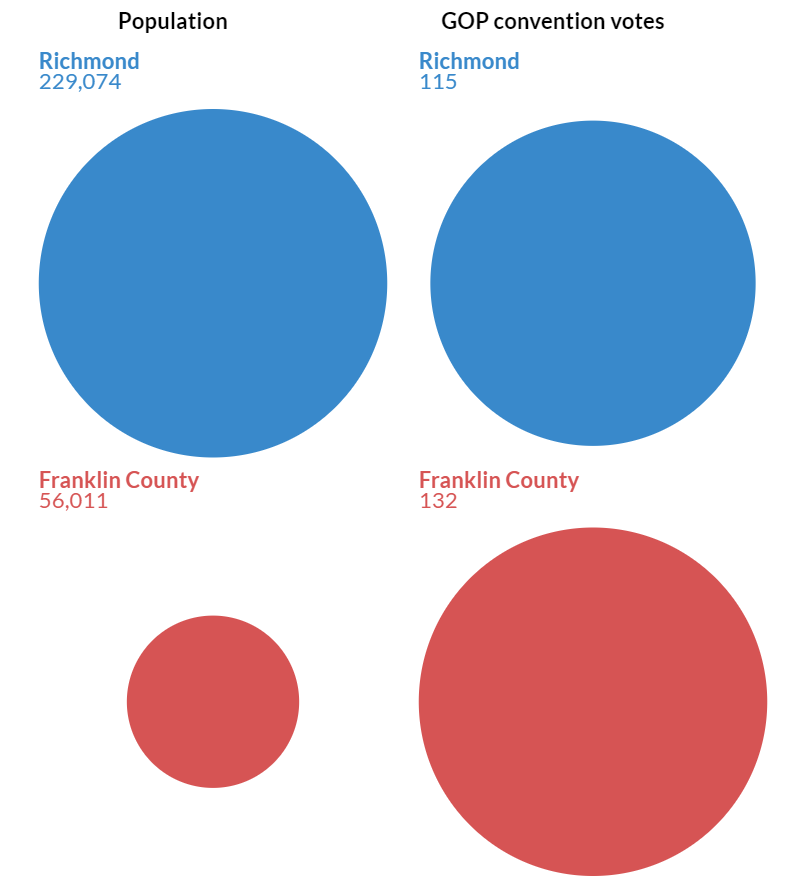
Franklin County had fewer residents than Richmond, but more votes at the 2021 Republican state convention
Source: Virginia Public Access Project, The GOP's Convoluted Nomination Process
If a unit elected more delegates than its total number of votes at the convention, then each delegate would cast just a fraction of a vote in the convention. If the unit qualified for more votes than the number of delegates elected, then the weight of those votes would be greater than one. For example, travel from Southwest Virginia to a convention was a burden. Scott County at times sent just two delegates when that unit was entitled to over 100 votes, based on previous support for Republican candidates. Each time the two delegates voted, their decision was multiplied so they cast 50+ weighted votes.
For the 2021 convention, the Virginia Public Access Project calculated the weight of each delegate's vote. Smyth County delegates ended up with the greatest impact:11
Voters would cast one ranked choice ballot, listing their top choice and ranking the remaining candidates as their #2 through #7 preference. In the tabulation of votes, if no candidate received over 50% of the vote on the first ballot, then candidates who received less than 10% of the vote would be eliminated.
If all candidates received at least 10%, then the one receiving the lowest number of votes would be eliminated. Ballots in which the delegate chose an eliminated candidate as the #1 choice would be counted again, but allocating the votes for the #2 choice candidate in the second round. If no one received over 50% of the votes in the second round, another candidate with the lowest number of votes would be eliminated. Delegates whose #1 preference was eliminated but who ranked other candidates as their second, third, and even lower choices still impacted the final selection throughout the process.
The ranked choice process was designed to guarantee that the final candidate would receive over 50% of the vote. It was clear to all Republican leaders that the voting process limited the potential of State Senator Amanda Chase getting the nomination for governor with just a plurality of votes.12
Before the votes were cast, she threatened again to run as an independent. She claimed one candidate, Pete Snyder, was hiring or contracting with chairs of local city/county units and the legal counsel for the Republican Party of Virginia, buying their support for the nomination. In King George County, the local chair accepted filings to be a delegate while attending a meet-and-greet for Snyder. Potential delegates for other candidates had to go to a Pete Snyder event to submit their paperwork.
State Sen. Chase said five weeks before the date of the unassembled convention:13
Just two weeks before the convention, the Republican Central Committee changed the rules again. It responded to concerns by Orthodox Jewish rabbis and Seventh Day Adventist leaders that they could not participate in a vote on May 8, because it was the Sabbath. After initially refusing to allow absentee voting on Friday, the Republican leadership created a religious exemption form and authorized those who used it to cast absentee ballots on Friday afternoon, May 7. The shift came after a direct request from the chair of the Republican National Committee.
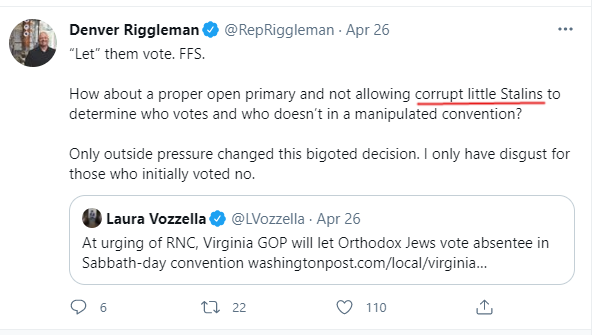
former Congressman Denver Riggleman had harsh words for Republican officials responsible for 2021 convention procedures
Source: Twitter (by Denver Riggleman, April 26, 2021)
The state committee also arranged for armed guards to transport all the ballots from the voting locations to Richmond, where all counting will occur. The party decided to count ballots by hand, a process which would require multiple tallies if at the end of the first tally no candidate had received 50% of the vote.
Prior to the decision to count ballots by hand, three of the four candidates for governor had jointly signed a letter expressing concern that a computerized vote count could be compromised. Amanda Chase, Kirk Cox and Glenn Youngkin claimed the company providing the "unproven software" for vote counting was associated with rival candidate Pete Snyder. That claim followed the assertions of former President Trump that the 2020 election was marred by masive voter fraud, and Republicans in multiple states passed "ballot integrity" measures.
Voter integrity questions in the Republican convention were sensitive because of Trump's continued claims that the 2020 election was rigged. He had insisted that every signature on absentee ballots in Georgia be checked against the signature on file. In 2021 the local Republican committees in Virginia certified delegates to the convention, even if the applications had been unsigned.
About 10% of the applications to be chosen as a delegate lacked the required nine-digit Voter Number. The chair of the credentials committee declared that applications for delegates would be accepted if just two fields were completed, for voter name and the voter address. Convention officials still required delegates to show a photo ID when casting their ballot at one of the 39 sites for the unassembled convention, even though the 2021 General Assembly had dropped the requirement that a photo be part of the required voter ID in state-run elections.
Complicating challenges to credentials based on voter identification requirements, the party's legal counsel was unable to provide advice. He was on the payroll of one of the candidates, so the chair of the party blocked him from participation in order to reduce the perception of bias.
The local units certified 53,650 official delegates but rejected applications from 729 people who sought to become delegates. Because some applications did not include contact information other than a postal address, some of those who were rejected could not be notified before the date of the convention. The state convention's credentials committee extended the deadline for appeals all the way to May 8. The credentials committee anticipated that at least one of the 729 who had applied to be a qualified delegate, and did not know they had been rejected, might try to vote at one of the 39 polling locations of the unassembled convention.
State Sen. Amanda Chase cast doubt on the integrity of the Republican-run election process before the convention. Echoing Trump's false claims regarding fraudulent elections and perhaps in preparation for running an independent campaign, she warned her supporters:14
The 2021 candidates campaigned in a unique way, because there were 17 candidates competing in the Republican convention for statewide offices and the ranked choice voting process required winning a majority (50% plus one) of the votes. Candidates not only sought to be the first choice of the voters - they also asked voters to make them their "Plan B" candidate. Voters could rank choices for Governor with #1, #2, #3, #4, #5, #6, and #7 on the ballot. There were six numbers to use for the six candidates for Lieutenant Governor, and four for Attorney General.
One advocate for Kirk Cox emphasized before the convention:15
Candidates sought to distinguish themselves from their rivals, but in 2021 several also made a special effort to compliment their rivals in hopes of being the second choice listed by that person's supporters. However, State Sen. Amanda Chase had a different campaign strategy:16
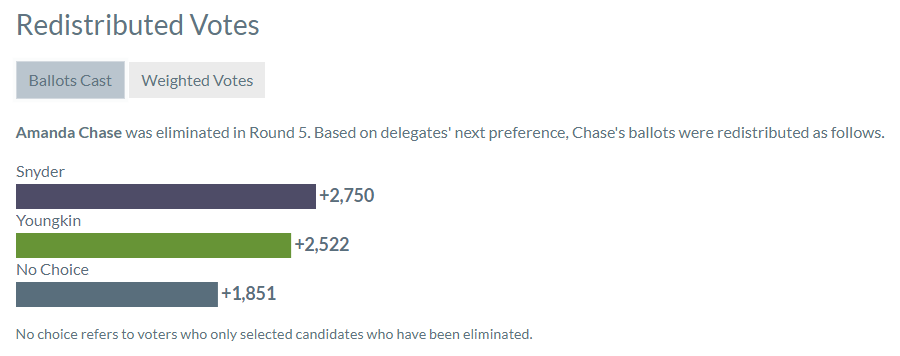
after Amanda Chase was eliminated in the fifth round of counting the ranked choice ballots, the remaining two candidates were allocated lower-preference votes from her delegates
Source: Virginia Public Access Project (VPAP), Republican Convention Results (2021)
About 30,000 of the 53,000 registered delegates went to one of the 39 polling places to cast votes. The eventual nominee was Glenn Youngkin. He led with a plurality on the first ballot with 33% of the vote, so he would have won in a primary.
When results of the sixth count were revealed on Monday night, Glenn Youngkin had captured 55% of the total vote and Pete Snyder had 45%. Youngkin had acquired a fortune estimated at $200 million before retiring from the Carlyle Group investment firm, and spent over $5 million in his campaign for the nomination.
The first ballot count for the three other main rivals gave Pete Snyder 26%, Amanda Chase 21%, and Kirk Cox 13%. Cox was eliminated after the fourth round, and Chase after the fifth round. Over 26% of those who chose State Sen. Amanda Chase ended up with "exhausted" ballots, where no later-choice candidates were still in contention after the fifth ballot. Over a quarter of the ballots cast with Chase as the first choice had no selection for Glenn Youngkin or Pete Snyder, so in the ranked choice voting process the preference of those voters was not relevant to the final count.
Youngkin lacked a track record of controversial political votes, in contrast to Kirk Cox and Amanda Chase, and had not been involved in previous intra-party fights like Pete Snyder. Snyder quickly declared his support for Glenn Youngkin, and Democrats recognized that he would be a formidable candidate with great fund-raising capacity.
A Republican talk-show host optimistically described the winner as a "shiny new penny." Another commentator suggested the former Wall Street leader was intentionally deceiving voters by fuzzing his positions on abortion and gun rights, but presenting himself as a traditional conservative in order to convince the Trump voters he was the "Great Right Hope."
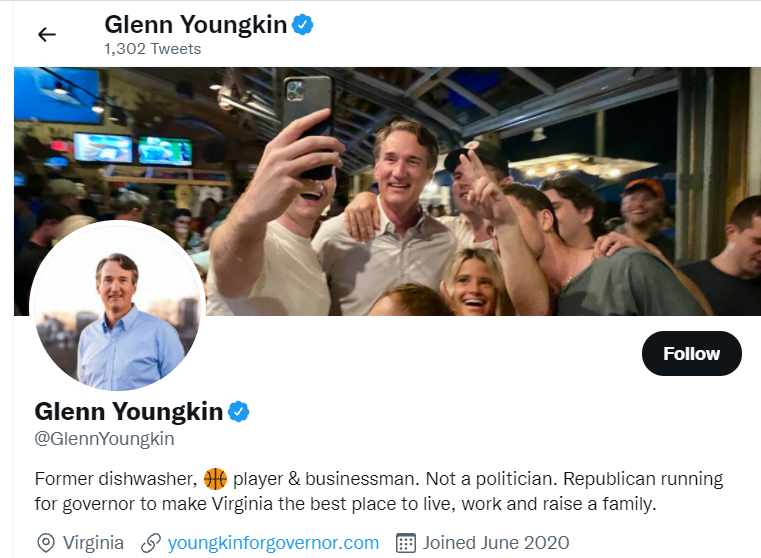
in 2021, Glenn Youngkin presented himself as a "former dishwasher" rather than as a Wall Street investor
Source: Twitter, Glenn Youngkin
Youngkin's chances of success in the general election were increased when Sen. Chase endorsed him. She declared she would not run as an independent; that was an option she was planning to take only if Pete Snyder had won.17
The successful Republican candidate for the Lieutenant Governor nomination, Winsome Sears, also led the race starting on the first ballot. The ranked choice voting process required five rounds before she finally earned more than 50% of the vote.
In the race for the Attorney General nomination, the second-place finisher demanded a recount. The final tally gave Jason Miyares a 52%-48% margin, and the party rules authorized a recount only if the margin of victory was 1% or less. Chuck Smith, who finished with 48%, had expressed strong support for former President Donald Trump in the campaign. His unsuccessful demand for a recount reflected Trump's approach in refusing to accept the results of the 2020 presidential election as valid, unless he was declared the winner.18
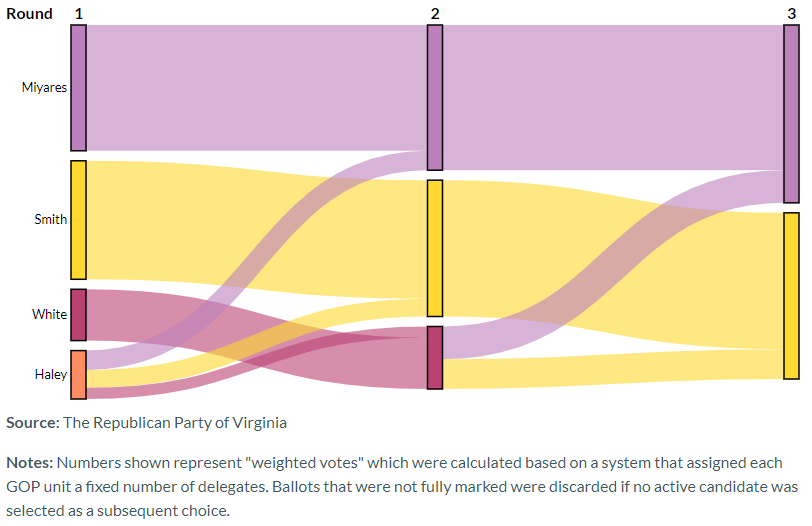
in three rounds of counting ranked choice ballots, Jason Miyares defeated Chuck Smith, Jack White, and Leslie Haley
Source: Virginia Public Access Project (VPAP), Getting to 50.01%
The Democratic Party nominated its 2021 candidates in a state-run primary rather than a convention. By election day on June 8, most limits on public gatherings due to the COVID-19 pandemic had been lifted.
Over 488,000 people voted in the Democratic Party primary race for Governor, in contrast to the 30,000 who attended the unassembled convention of the Republican Party. That 488,000 total was still just 8% of registered voters. It was higher than the 6.4% who voted in the 2009 primary, but lower than the 9.9% who voted in 2017 when Democrats were energized after the election of President Trump.
One political analyst noted:19
The November general election results altered the presumption that Virginia had trended from a red-to-purple-to-blue state since the Republicans last won a statewide race in 2009.
The Republican candidates won all three races for Governor, Lieutenant Governor, and Attorney General. They also took control of the House of Delegates with a 52-48 majority. The Democrats remained in control of the State Senate; those 40 seats were not on the ballot until 2023.20
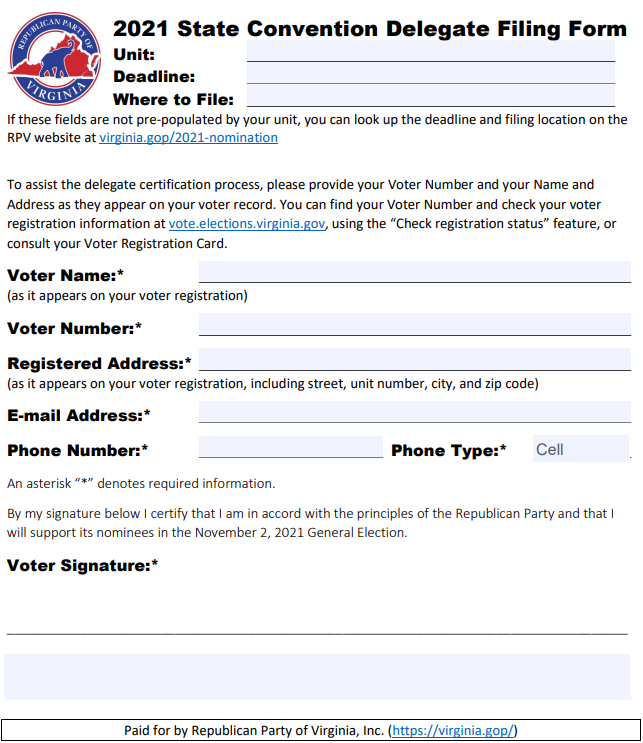
Republicans were supposed to provide their voter number 14 days in advance, before they could be chosen as a delegate to the 2021 unassembled convention
Source: Republican Party of Virginia, 2021 State Convention Delegate Filing Form
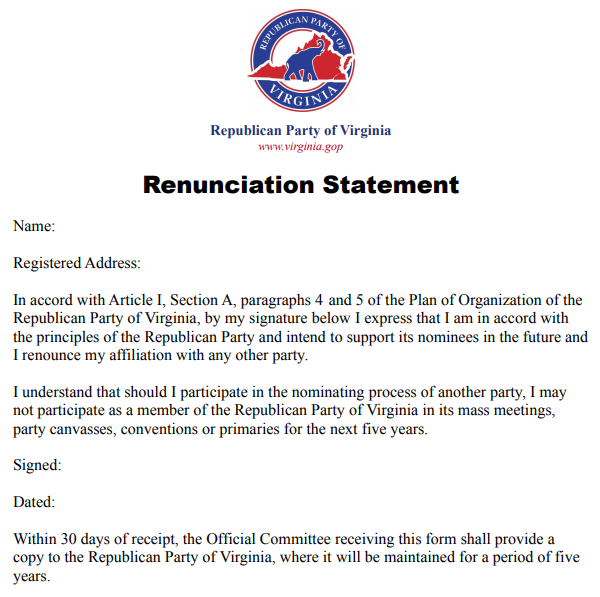
Republican leaders sought to ensure party loyalty from delegates to the 2021 unassembled convention, which was not possible if a state-run primary had been used for nominating statewide candidates
Source: Republican Party of Virginia, Renunciation Statement Form (2021)
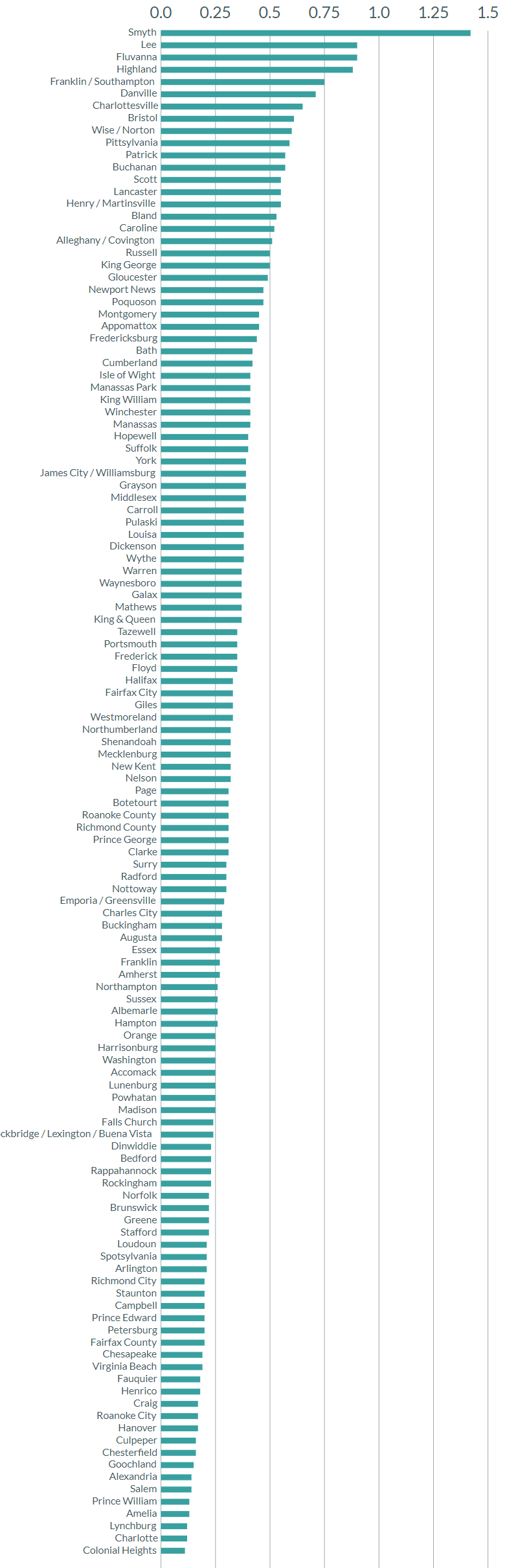
individual votes by delegates from Smyth County had the greatest weight in the 2021 Republican convention
Source: Virginia Public Access Project, Some GOP Ballots Worth More Than Others